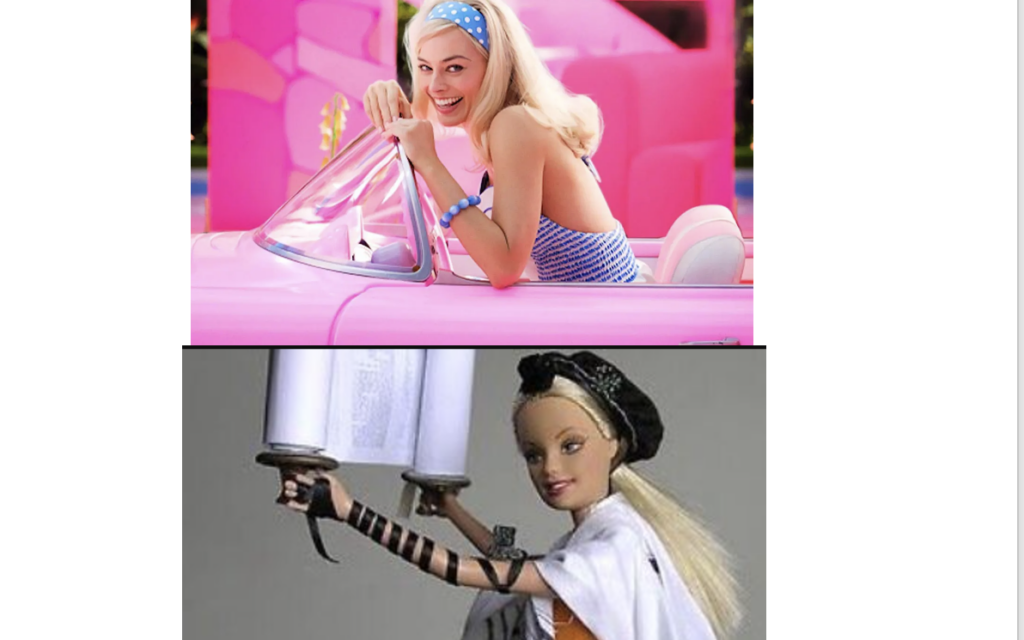BARBIE: More Jewish than you ever imagined.
The live action movie about the perfect doll opens next week and this film has lots of faith connections
BARBIE was always everything I was not: tall, with poker straight blonde hair and enormous boobs. She also had a gorgeous boyfriend called Ken, a myriad of fantastic careers and gorgeous pink, sparkly clothes.
Not only was she the antithesis of a small, dark, frizzy-haired, flat-chested Jewish pre-teen, but she was elusive in other ways. Instead of the Barbie that I dreamed of, my parents got me a Sindy – the cheap British imitation of Barbie – and expected me to be grateful. I quickly pulled her leg off and was then stuck playing with a one-legged doll.
My little sister – with her second child advantage – did get a Barbie and, to be honest, it still rankles.
Get The Jewish News Daily Edition by email and never miss our top stories Free Sign Up
So, I will be watching Barbie the film with a mixture of emotions when it comes out in July. Penned by Jewish award-winner Noah Baumbach – best known for his quirky and autobiographical works such as Marriage Story and The Meyerowitz Stories – and his partner Greta Gerwig, it will be pink and sparkly but also funny clever, and socio-politically current.

Baumbach feels like a good fit to be telling this story because like so many legends of the American dream – from the White Christmas to the Hollywood ending – Barbie is a Jewish story with a big amount of goyishe wish-fulfilment. She was also, rather amusingly, inspired by a sex toy.
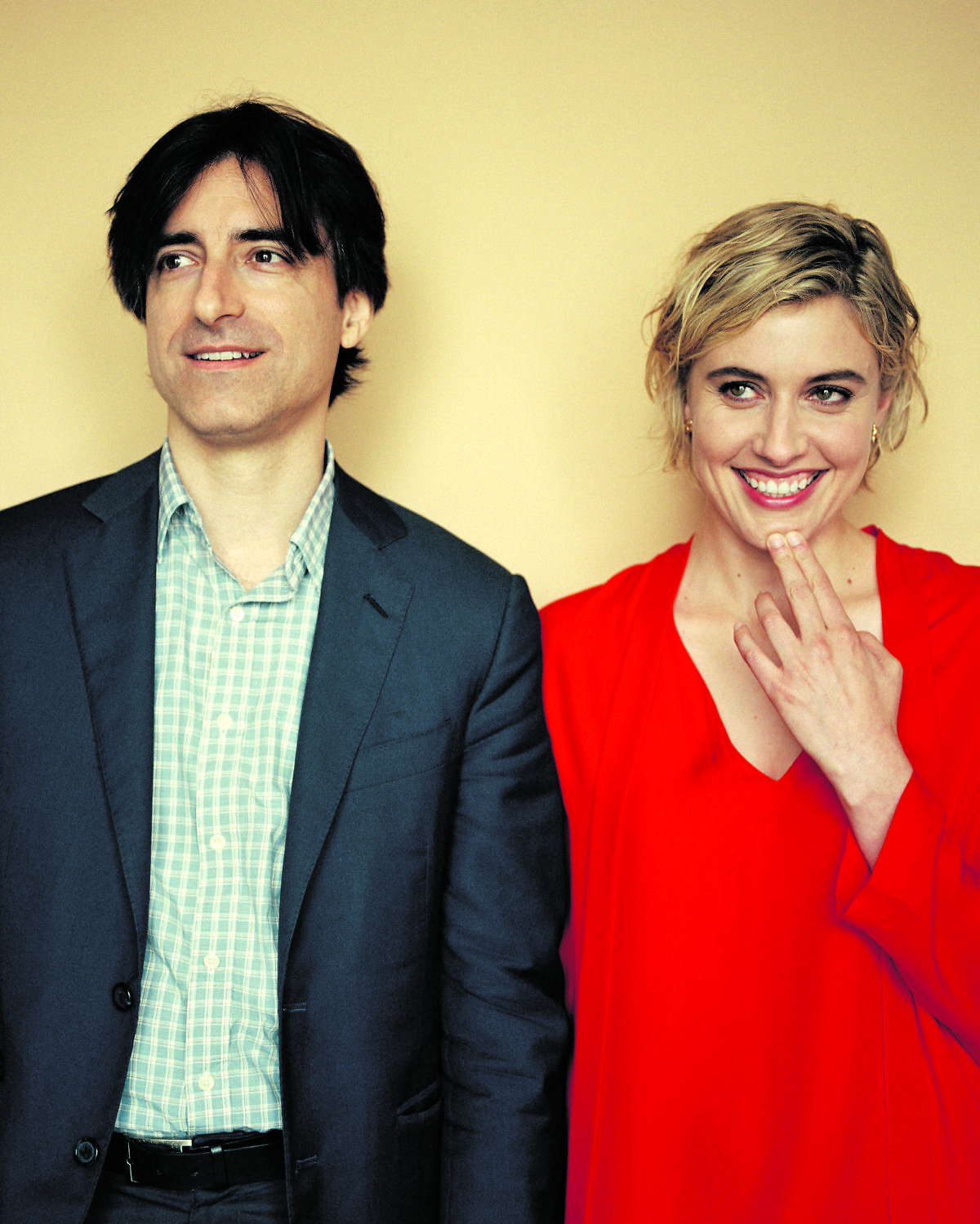
The plastic doll, who has also weathered childhood trends, outlived Sindy and saw off competition from the Bratz, was invented by Ruth Handler, born Ruth Moskowicz, the daughter of Jewish Polish immigrants, in Colorado in 1916. Ruth, the youngest of ten children, knew poverty and was inspired by the example of her big sister who had gone into business and also helped raise her.
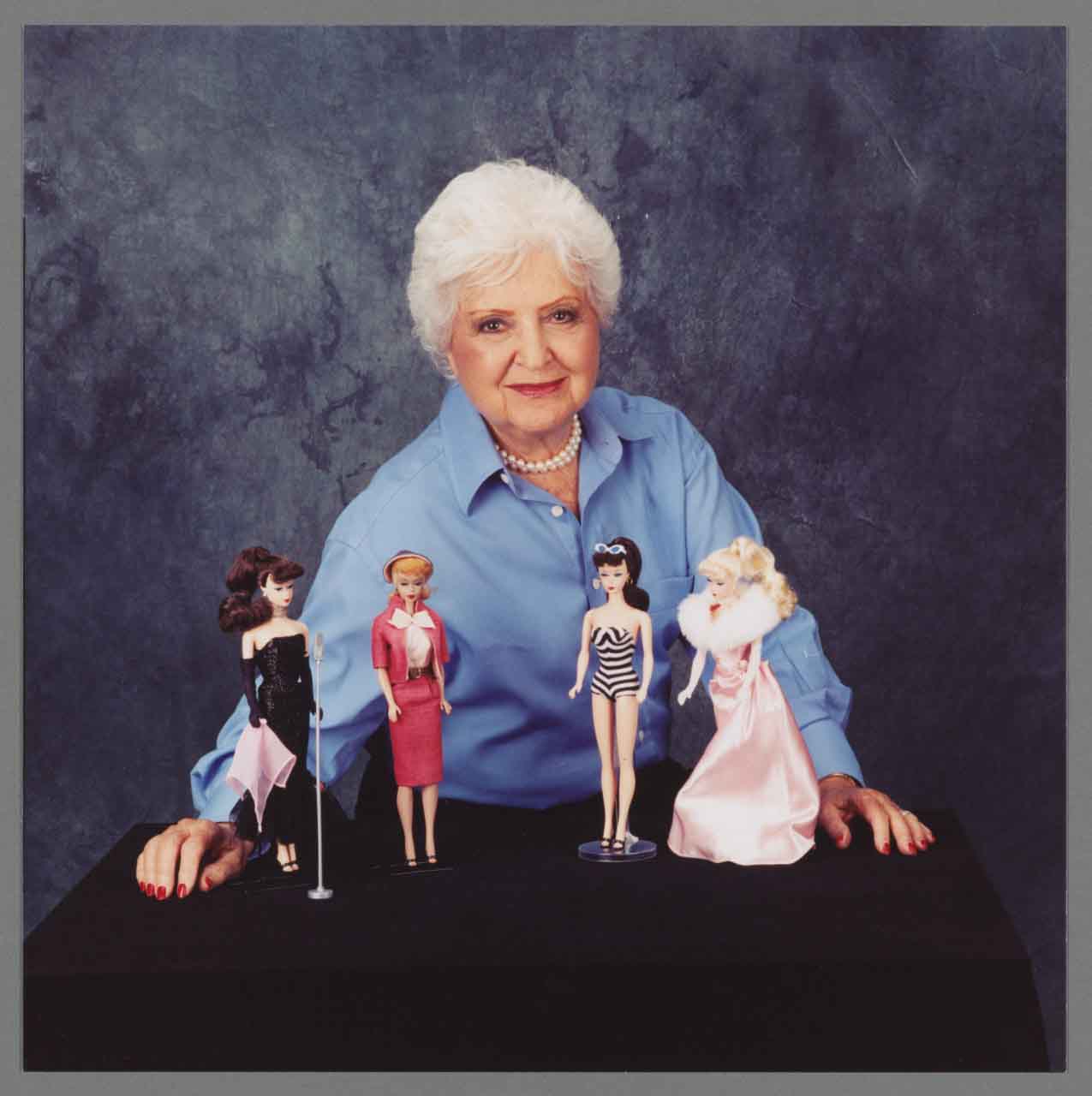
Ruth moved to Los Angeles to explore the new world of Hollywood and was followed there by Elliot Handler, an aspiring artist she’d met at a B’nai Brith dance when they were both 16. The pair married in 1938 and founded a plastic and wood business making props and toys for Hollywood studios. With another propmaker, Matt Mason, they founded Mattel – a combination of the men’s names. It was Ruth, however, who was to come up with the toy which was to make the company’s fortune.
Ruth and Elliot had two children, Barbara and Ken. At the time the fashionable dolls were often made of paper and Ruth noticed that Barbara and her friends gravitated towards dolls with womanly shapes.
‘Barbara and her friends always insisted on playing with adult female paper dolls; they were simply not interested in baby paper dolls or even those representing ten-year-olds,’ Ruth wrote in her autobiography, Dream Doll. ‘I discovered something very important: They were using these dolls to project their dreams of their own futures as adult women.’
Ruth decided she needed a doll with breasts and hips, that could be used in play for girls with aspirations like she had; a doll that was a working woman who could be an astronaut or a ballerina, a movie star or a scientist. And that’s where the sex doll came in.
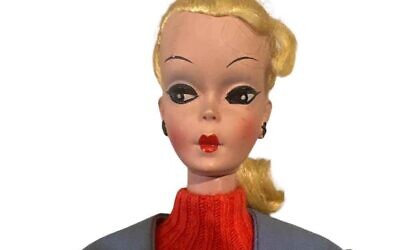
The Handlers were on a family holiday to Switzerland in 1956 when Ruth came across a German doll called Bild Lilli. Modelled on a cartoon about a buxom blonde seductress, the dolls were designed for amorous German men to give to their girlfriends and mistresses when they were in the mood. Lilli had her own tagline: ‘Gentlemen prefer Lilli. Whether more or less naked, Lilli is always discreet.’
Lilli came home with the Handlers where she was remade and repackaged in 1959 as Barbie – named after Ruth’s daughter – with the help of another Jewish immigrant, psychologist turned marketing guru Ernst Ditcher. There was surprisingly little difference between Lilli and Barbie although the latter sported less make up and had feet (Lilli only had stilettoes). She came with the slogan, ‘You Can Be Anything’.
Barbie was an immediate hit, selling 350,000 units in her first year. Three years later Ken – named after Ruth’s son – arrived. Today more than a billion Barbie dolls have been sold. But there have always been detractors.
From the off there was much criticism of Barbie’s unattainable stereotypical figure and lack of ambition. Speaking in the documentary film ‘Tiny Shoulders: Rethinking Barbie’ feminist Gloria Steinem noted: ‘Barbie was pretty much everything the feminist movement was trying to escape from.’
Meanwhile, in 1995 fundamentalists in Kuwait issued a fatwa against Barbie because of her ‘mature’ figure, while in 2003 Saudi Arabia outlawed Barbie sales claiming that the ‘Jewish Barbie’ was a symbol of decadence and perversion.
But that hasn’t put a dent in Barbie’s staying power. She’s held over 200 jobs and even ran for President in the 1990s. Barbie also now comes in four body shapes; original, tall, petite and curvy, and is available in 20 different skin tones. There’s even one with enough dark curls that you could almost say she had a Jewfro.
Mattel has been trying to make a Barbie film since 2009 and in 2016 blonde Jewish comic actress Amy Schumer was cast to both play the titular role and co-write the script. But there was immediate criticism – with trolls saying that she was too ‘fat’ to play the doll. She responded with an impassioned Instagram post saying that she had sympathy for the trolls ‘who are in more pain than we will ever understand’ adding: ‘I want to thank them for making it so evident that I am a great choice.’ But four months later she backed out of the project.

The idea was kicked off again by Margot Robbie whose production company bought the rights and she approached writer, director and actress Gerwig to write the script.
‘She came to me and said, ‘Would you be interested in writing this?’ Gerwig later recalled. ‘And I said, ‘Yes!’ and then I said, ‘And Noah would like to write it too. And I had not really talked to Noah about this. A few months later Noah said, ‘Are we meant to be writing a Barbie movie?’ And I said, ‘Yes.’ He said, ‘I don’t have any ideas for that!’ But once they started thinking about it, they came up with an idea that is already generating a huge amount of buzz.
Details of the story are still mainly under wraps but it’s based on Barbie and Ken travelling to the human world. The film’s official synopsis says: “To live in Barbie Land is to be a perfect being in a perfect place. Unless you have a full-on existential crisis. Or you’re a Ken.”
Barbie and Ken – with Margot playing the famous doll and Ryan Gosling as her paramour – are once again blonde, blue-eyed and not very typically Jewish but as well as behind the scenes, there is Jewish talent in front of it.

British Jewish rising star Kingsley Ben-Adir – who first found fame in Peaky Blinders and has also starred as Barack Obama in The Comey Rule – will play one of the Ken dolls in the film. Born in 1986, he, his Trinidadian mother, and his brother all converted to Judaism. His next project is due to be just as big as Barbie – he’s signed to play reggae legend Bob Marley (whose father was said to have Jewish ancestry) – in a new film.
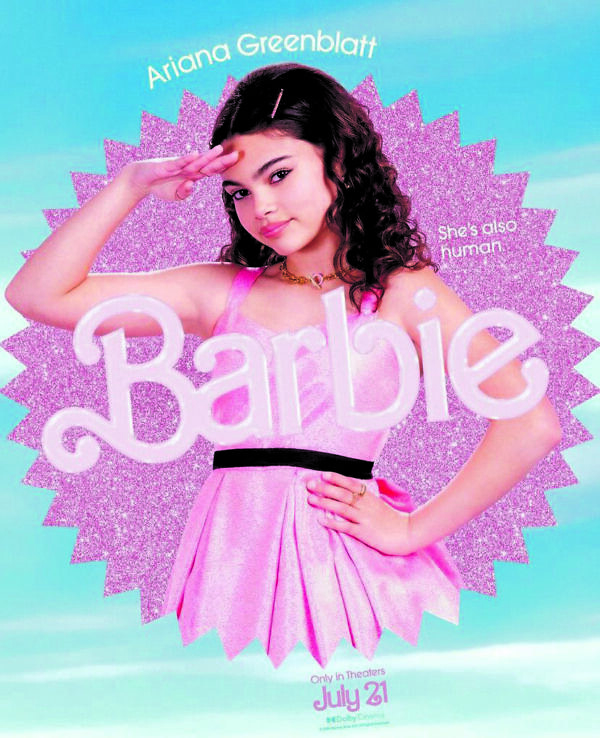
Meanwhile child star Ariana Greenblatt, whose mother is Jewish and father Puerto Rican, is set to play a human called Sasha in the film. Despite being just 15, the American has a string of films including Avengers: Infinity War and new film 65, to her name.
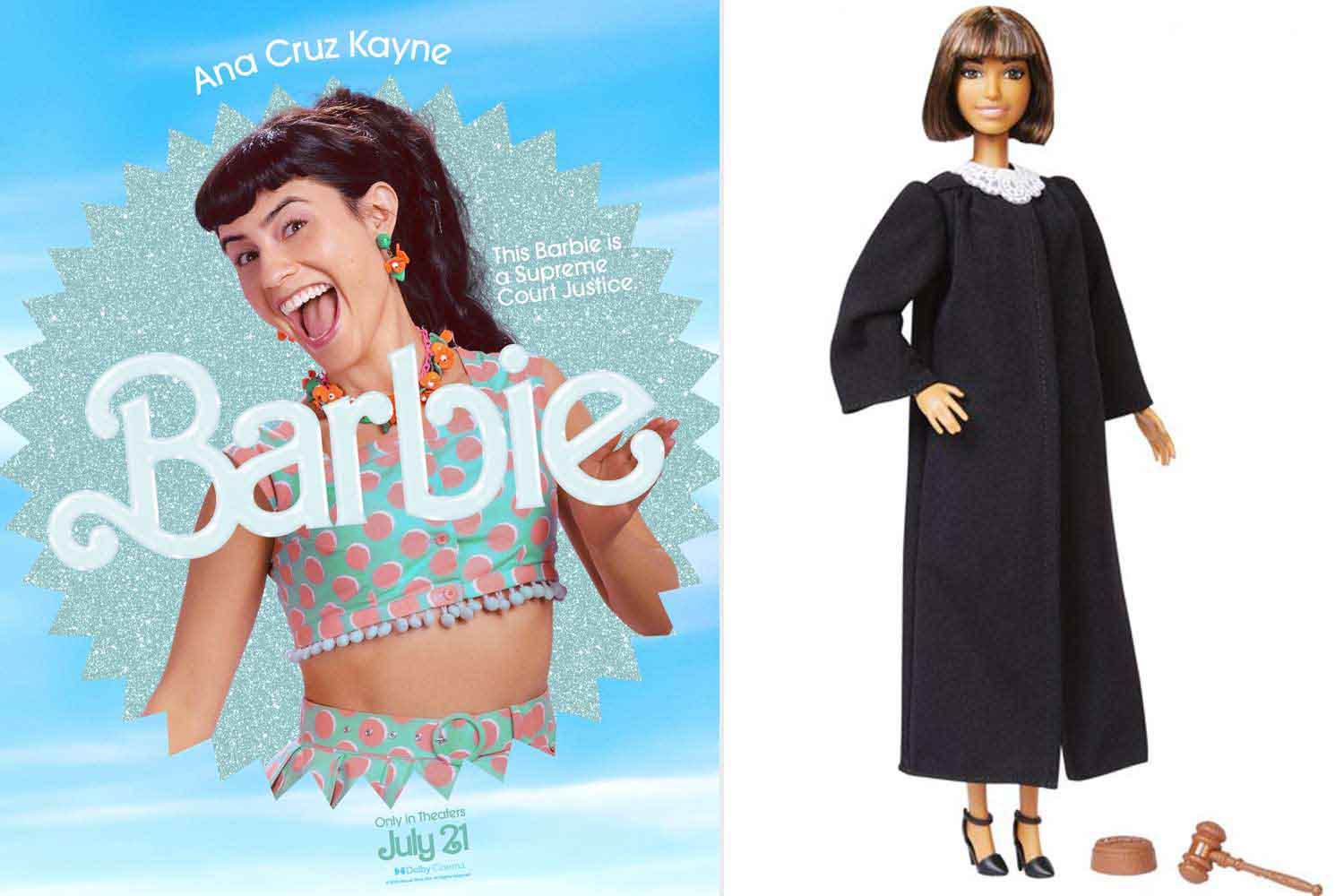
Jewish Filipina actress Ana Cruz Kayne will appear as Barbie Supreme Court Justice while American model Hari Nef is playing Barbie Doctor. In April the trans star revealed the moving letter she wrote to Gerwig when it appeared a scheduling conflict meant she would be unable to take the role.
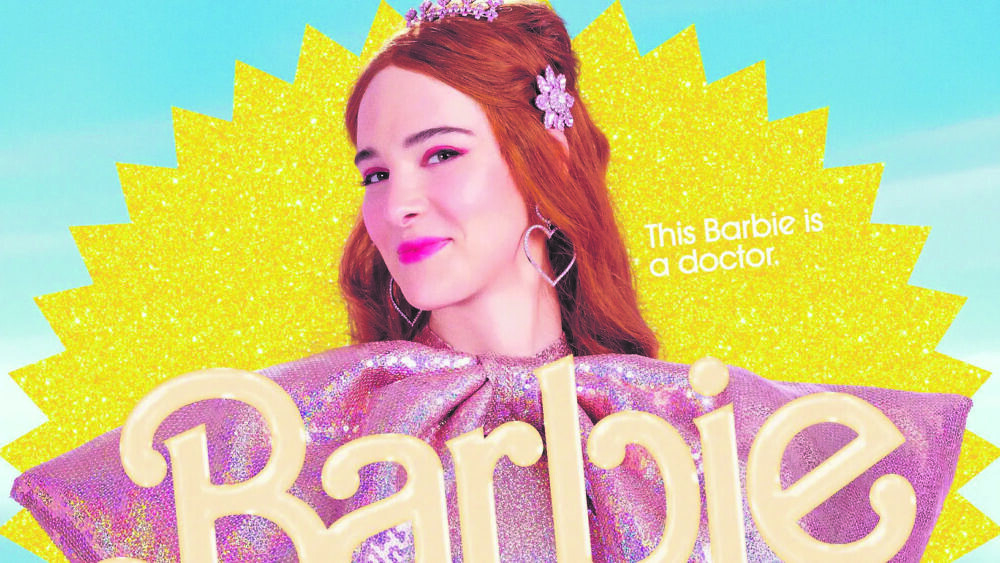
Nef’s letter said: ‘The name Barbie looms large over every American woman. Barbie’s the standard, she’s The Girl, she’s certainly THE doll. Me and my transgender girlfriends started calling ourselves ‘the dolls’ a couple of years ago. Maybe it’s a bid to ratify our femininity, to smile and sneer at the standards we’re held to as women. Underneath the word ‘doll’ is the shape of a woman who is not quite a woman – recognisable as such but still a fake. We call ourselves ‘the dolls’ in the face of everything we know we are, never will be, hope to be. We yell the word because the word matter. And no doll matters more than Barbie.’
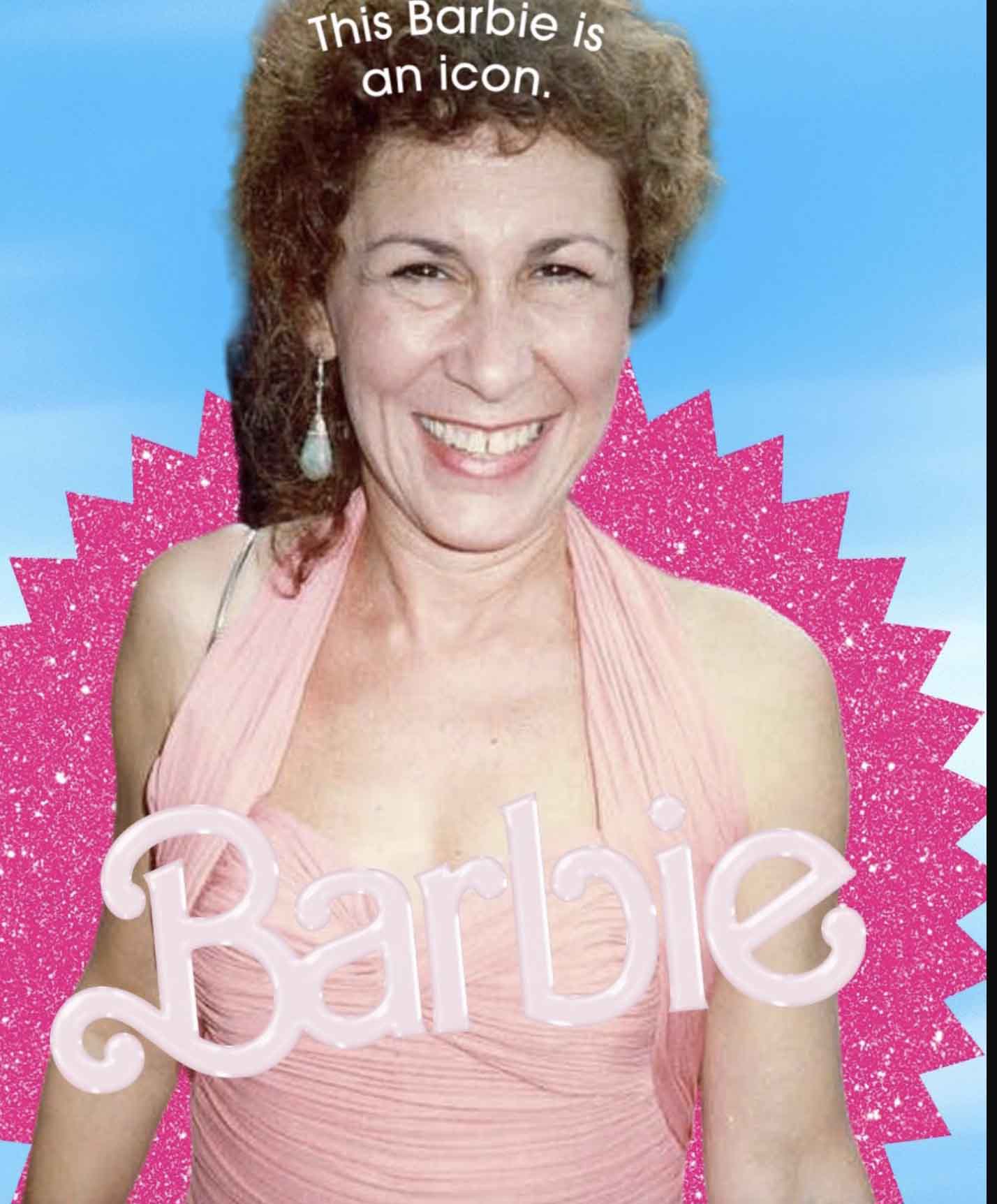
And, finally, Cheers legend Rhea Perlman is playing a character who has not yet been named. She says of the film: ‘We’re not allowed to talk about anything specific in it, but it was fantastic. I can tell you, it’s going to be a really great film. It’s not just some ditzy movie about a doll. It’s very different and quite beautiful and really fun.’
I’m now several decades too old to play with Barbie but have to admit – despite that lingering resentment (none of which is Barbie’s fault) – I can’t wait to see the film of this very special Jewish doll.
Barbie is set for release this summer.

Thank you for helping to make Jewish News the leading source of news and opinion for the UK Jewish community. Today we're asking for your invaluable help to continue putting our community first in everything we do.
For as little as £5 a month you can help sustain the vital work we do in celebrating and standing up for Jewish life in Britain.
Jewish News holds our community together and keeps us connected. Like a synagogue, it’s where people turn to feel part of something bigger. It also proudly shows the rest of Britain the vibrancy and rich culture of modern Jewish life.
You can make a quick and easy one-off or monthly contribution of £5, £10, £20 or any other sum you’re comfortable with.
100% of your donation will help us continue celebrating our community, in all its dynamic diversity...
Engaging
Being a community platform means so much more than producing a newspaper and website. One of our proudest roles is media partnering with our invaluable charities to amplify the outstanding work they do to help us all.
Celebrating
There’s no shortage of oys in the world but Jewish News takes every opportunity to celebrate the joys too, through projects like Night of Heroes, 40 Under 40 and other compelling countdowns that make the community kvell with pride.
Pioneering
In the first collaboration between media outlets from different faiths, Jewish News worked with British Muslim TV and Church Times to produce a list of young activists leading the way on interfaith understanding.
Campaigning
Royal Mail issued a stamp honouring Holocaust hero Sir Nicholas Winton after a Jewish News campaign attracted more than 100,000 backers. Jewish Newsalso produces special editions of the paper highlighting pressing issues including mental health and Holocaust remembrance.
Easy access
In an age when news is readily accessible, Jewish News provides high-quality content free online and offline, removing any financial barriers to connecting people.
Voice of our community to wider society
The Jewish News team regularly appears on TV, radio and on the pages of the national press to comment on stories about the Jewish community. Easy access to the paper on the streets of London also means Jewish News provides an invaluable window into the community for the country at large.
We hope you agree all this is worth preserving.
-
By Brigit Grant
-
By Laurent Vaughan - Senior Associate (Bishop & Sewell Solicitors)
-
By Laurent Vaughan - Senior Associate (Bishop & Sewell Solicitors)
-
By Laurent Vaughan - Senior Associate (Bishop & Sewell Solicitors)
-
By Laurent Vaughan - Senior Associate (Bishop & Sewell Solicitors)


